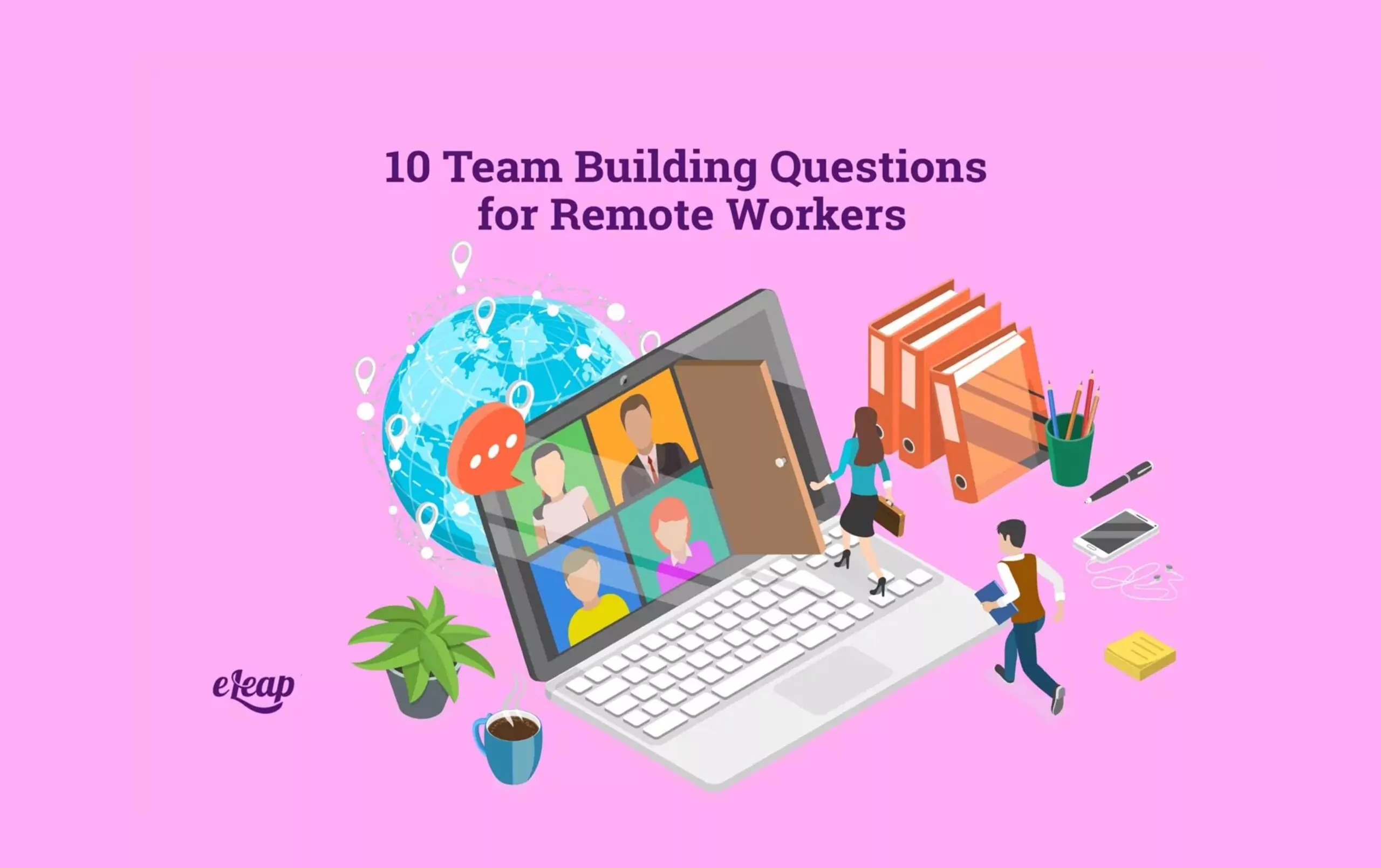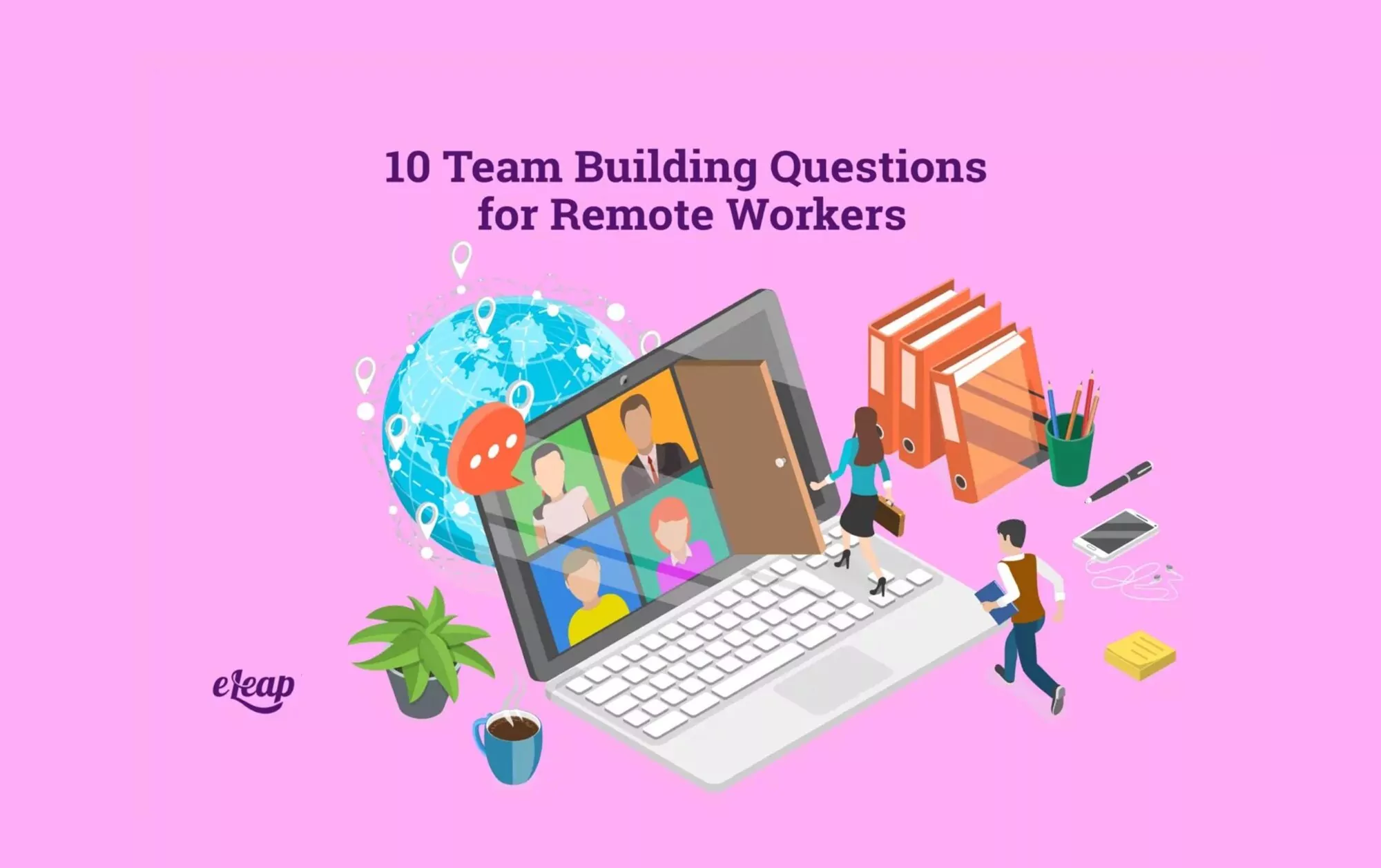10 Team Building Questions for Remote Workers

Have you considered composing a list of team building questions for remote workers? In today’s culture of work-from-home and hybrid employees, it can be challenging to build a strong company culture. Little time for communication often leads to the challenge of how to have effective communication. Asking the right questions is an excellent place to start.
Have you noticed that when you feel free to ask someone questions, it helps to build a more significant amount of trust? Asking purposeful questions helps to build a cohesive team regardless of physical distance. Using the right questions at the right time allows leaders to connect with their team members, creating a more engaged workforce.
The following ten questions are designed for supporting your team and maintaining a resilient company culture.
1. How do you feel today, and do you feel energized?
Nonverbal clues let you know how someone is feeling. When everyone commutes to the office for work, a manager can easily gauge energy levels and how they feel. However, you can’t see those clues when you only communicate via email or slack.
The practice of Intentional Energetic Presence, IEP, is a metric that assesses the team’s energy levels. The practice can be easily added to your daily routine. For example, at the beginning of the morning meeting, have everyone share their IEP levels. The levels are based on a 10 point scale, with one being the lowest, most disengaged energy level possible, and ten being the highest, most present possible energy level.
When you ask your employees this question, it allows them to see you care about them as individuals.

2. How did your week go last week? Did you have challenges? Tell me about a win you had—big or small.
Asking this question allows you to catch issues your employees are having before they get too large to handle. More important than that is it helps you learn what is going right for your employees.
When you ask team building questions of your remote workers, it allows them to share small and big wins. You can then recognize their hard work. Each time you show appreciation for their hard work, the emotions that are elicited will lead to a more extended sense of positivity. Also, asking the question often allows you to celebrate positives with regularity and deal with negatives quicker.
3. Do you have ideas that could help improve our daily communication?
The joys of working with multiple people include dealing with individuality. Everyone is different, so everyone communicates differently. If you learn how your remote workers communicate, your one-on-one sessions will be more meaningful.
One way to improve your daily communications could be to implement daily virtual meetings that establish the day’s agenda. Your employee could need you to block communications at certain times so work flows better for them. Honor the individual’s communication needs for the best results.
4. Since you work remotely, let me ask you this question. What do you find the most purposeful, energizing, or draining about your role?
Asking your remote workers this question allows you to learn about their strengths and weaknesses. Make it a habit to ask them which parts of their day they find the most exciting. Doing this will allow you to know what helps them perform well and what is slowing their growth. You will also learn what work ignites their passions.
Remote workers often receive tasks they are trusted to do well. However, they might not find those tasks enjoyable. Management may not know the employees aren’t feeling fulfilled if they don’t ask. Asking this question of your remote workers gives insight into their motivation, allowing you to find projects they will enjoy.
5. Tell me about a skill you would like to improve or develop.
Today’s workers enjoy more flexibility than in past workforces. They aren’t tied to a predetermined career path. Rather, new pathways are evolving routinely since technology is progressing rapidly. Many employees miss opportunities because they are unaware of the resources that are available.
Employees want to grow both personally and professionally. The manager is tasked with helping them with that growth. When you learn more about your remote workers’ interests, you empower them to grow within the constraints of the company instead of separate from it.
Additionally, helping employees develop skills adds to their knowledge base. It can also help to change old methods that are holding the company back. Believe it or not, remaining stagnant can actually be a push backward.
6. Do you have any questions regarding your role on the team and what you should be working on? What aspects should I clear up for you?
Without asking this question of your remote workers, you won’t know if they are struggling to know where they fit within the company. Without a clear direction, the employee will make assumptions about the correct path. Often, an assumption will lead to the wrong path, and the employee’s development can be significantly reduced. Remote workers are often more likely to feel isolated from the team if their manager doesn’t maintain a strong connection with them.
Help your employees define the scope of their success with this question. This gives them the opportunity to strive for success continuously.
7. Do you feel most energized and successful when you work alone or when you collaborate with others?
Many employees stay quiet rather than speak up when they have a concern or idea. As a manager, part of the job is to help your remote workers feel heard. Introverted employees often need space to create and be innovative. Use this team building question for your remote workers as a tool for learning how well they collaborate.
8. Are you comfortable telling me about a personal goal that the company can support you in pursuing?
When you have productive employees, you will often see them going above and beyond what is required of them. This is often revered as the way to work. However, it may not be the best route to success. Some tasks need to be handled as a way to focus on personal growth and development.
Remember, professional and personal goals aren’t necessarily in competition with each other. A manager supporting personal goals may seem odd, but the experience can promote strong relationships and an uptick in commitment. When people feel more fulfilled, they are more energetic while they work.
9. How do you find communication between team members, leaders, managers, and directors?
Do you have genuine, thought-provoking conversations with your team? If you don’t provide routine access to company-wide communications tools like surveys and conversation forums, your remote workers may feel left out of the conversation. If you can provide ways for remote workers to give feedback, they are more likely to communicate openly.
10. Tell me what you do to recharge and take a break from working during the day.
Remote work has perks as well as challenges. When you work and live in the same place, it can become difficult to separate professional and personal time. Ask your remote workers this team building question to help them draw clear lines between work and personal life.
Remote workers often find themselves working well beyond traditional office hours. They sometimes find themselves having difficulty leaving work “at the office” because the office is literally their home.
Breaks are a much needed portion of a successful day. Sometimes, remote workers forget to take their breaks and work straight through the shift. They can then find themselves overextended and burned out. Remind them to periodically walk away from their desk or work area and recharge. A simple walk to the coffeepot for a fresh cup of coffee can do wonders for their productivity.
When you ask this question, you also gauge how collaboration is going between remote and in-person workers. Knowing their answers help you to support their efforts in communicating with other team members. It can help them step away from their comfort zones into a more collaborative model of work.
Final Thoughts
More employees are embracing a remote model of work. As more workers are away from the office, they risk losing the camaraderie and support of their team. A manager’s responsibility remains to facilitate a team atmosphere even when some team members are remote and others are in the office.
When you wish to check with your remote team to gauge progress or facilitate communication, you need your own set of tools to assist you in those goals. Use these ten team building questions for your remote workers to help you have more meaningful one-on-one communication. As you build strong connections with your remote workers, it will help you facilitate strong connections between your team members.
Remember, remote workers, risk feeling disconnected. It’s imperative that they be included in team activities and team culture. Gauge their progress, facilitate meetings, support the expansion of their skills, and clarify their team roles using these simple, powerful questions.